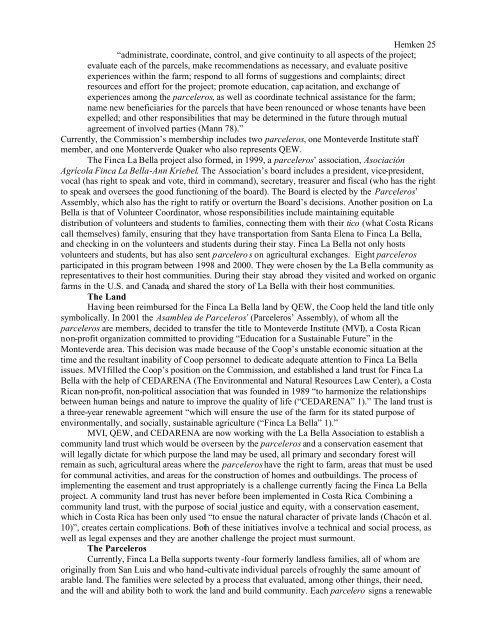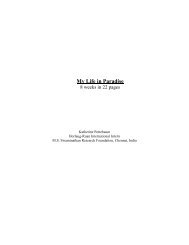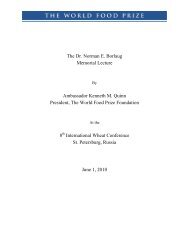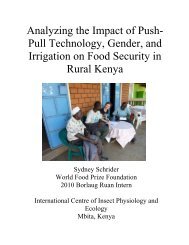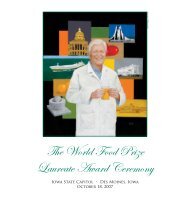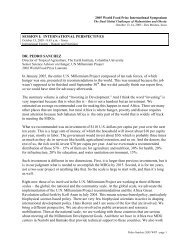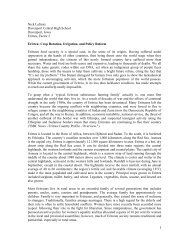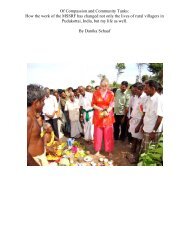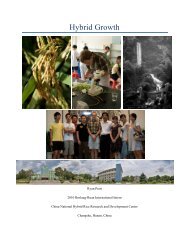A Green Mountain with a Valley Just Right - The World Food Prize
A Green Mountain with a Valley Just Right - The World Food Prize
A Green Mountain with a Valley Just Right - The World Food Prize
You also want an ePaper? Increase the reach of your titles
YUMPU automatically turns print PDFs into web optimized ePapers that Google loves.
Hemken 25“administrate, coordinate, control, and give continuity to all aspects of the project;evaluate each of the parcels, make recommendations as necessary, and evaluate positiveexperiences <strong>with</strong>in the farm; respond to all forms of suggestions and complaints; directresources and effort for the project; promote education, cap acitation, and exchange ofexperiences among the parceleros, as well as coordinate technical assistance for the farm;name new beneficiaries for the parcels that have been renounced or whose tenants have beenexpelled; and other responsibilities that may be determined in the future through mutualagreement of involved parties (Mann 78).”Currently, the Commission’s membership includes two parceleros, one Monteverde Institute staffmember, and one Monterverde Quaker who also represents QEW.<strong>The</strong> Finca La Bella project also formed, in 1999, a parceleros’ association, AsociaciónAgrícola Finca La Bella-Ann Kriebel. <strong>The</strong> Association’s board includes a president, vice-president,vocal (has right to speak and vote, third in command), secretary, treasurer and fiscal (who has the rightto speak and oversees the good functioning of the board). <strong>The</strong> Board is elected by the Parceleros’Assembly, which also has the right to ratify or overturn the Board’s decisions. Another position on LaBella is that of Volunteer Coordinator, whose responsibilities include maintaining equitabledistribution of volunteers and students to families, connecting them <strong>with</strong> their tico (what Costa Ricanscall themselves) family, ensuring that they have transportation from Santa Elena to Finca La Bella,and checking in on the volunteers and students during their stay. Finca La Bella not only hostsvolunteers and students, but has also sent parcelero s on agricultural exchanges. Eight parcelerosparticipated in this program between 1998 and 2000. <strong>The</strong>y were chosen by the La Bella community asrepresentatives to their host communities. During their stay abroad they visited and worked on organicfarms in the U.S. and Canada, and shared the story of La Bella <strong>with</strong> their host communities.<strong>The</strong> LandHaving been reimbursed for the Finca La Bella land by QEW, the Coop held the land title onlysymbolically. In 2001 the Asamblea de Parceleros’ (Parceleros’ Assembly), of whom all theparceleros are members, decided to transfer the title to Monteverde Institute (MVI), a Costa Ricannon-profit organization committed to providing “Education for a Sustainable Future” in theMonteverde area. This decision was made because of the Coop’s unstable economic situation at thetime and the resultant inability of Coop personnel to dedicate adequate attention to Finca La Bellaissues. MVI filled the Coop’s position on the Commission, and established a land trust for Finca LaBella <strong>with</strong> the help of CEDARENA (<strong>The</strong> Environmental and Natural Resources Law Center), a CostaRican non-profit, non-political association that was founded in 1989 “to harmonize the relationshipsbetween human beings and nature to improve the quality of life (“CEDARENA” 1).” <strong>The</strong> land trust isa three-year renewable agreement “which will ensure the use of the farm for its stated purpose ofenvironmentally, and socially, sustainable agriculture (“Finca La Bella” 1).”MVI, QEW, and CEDARENA are now working <strong>with</strong> the La Bella Association to establish acommunity land trust which would be overseen by the parceleros and a conservation easement thatwill legally dictate for which purpose the land may be used, all primary and secondary forest willremain as such, agricultural areas where the parceleros have the right to farm, areas that must be usedfor communal activities, and areas for the construction of homes and outbuildings. <strong>The</strong> process ofimplementing the easement and trust appropriately is a challenge currently facing the Finca La Bellaproject. A community land trust has never before been implemented in Costa Rica. Combining acommunity land trust, <strong>with</strong> the purpose of social justice and equity, <strong>with</strong> a conservation easement,which in Costa Rica has been only used “to ensue the natural character of private lands (Chacón et al.10)”, creates certain complications. Both of these initiatives involve a technical and social process, aswell as legal expenses and they are another challenge the project must surmount.<strong>The</strong> ParcelerosCurrently, Finca La Bella supports twenty -four formerly landless families, all of whom areoriginally from San Luis and who hand-cultivate individual parcels of roughly the same amount ofarable land. <strong>The</strong> families were selected by a process that evaluated, among other things, their need,and the will and ability both to work the land and build community. Each parcelero signs a renewable


